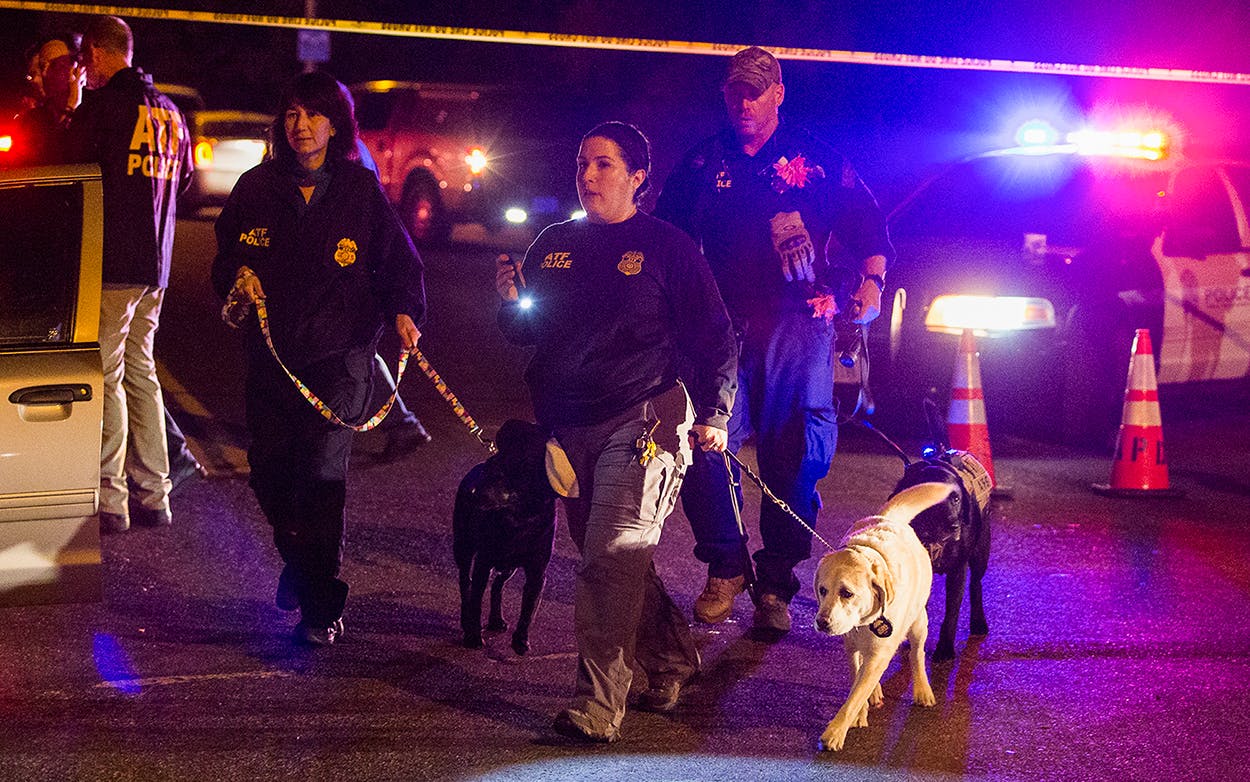An explosion triggered by a trip wire injured two men in an Austin neighborhood near Southwest Parkway and MoPac on Sunday night, the fourth in a string of bombings that police believe are connected but have otherwise left investigators stumped.
The latest incident significantly expanded the geography of the attacks—from East Austin to Southwest Austin—and suggests, at least in the latest case, a change from specific targets to more random targets, deepening angst for this city of nearly one million people.
“We have seen similarities in the device that exploded here last night and the other three devices that have exploded in Austin,” Austin police chief Brian Manley said at a press conference late Monday morning. “The big difference in this device is that we believe a trip wire was used…this shows a higher level of sophistication and skill. If you see any suspicious item that looks out of place, do not even approach it. Call 911.”
The previous three explosions were caused by bombs disguised as packages that were left on the victims’ doorsteps overnight. Thirty-nine-year-old Anthony Stephan House, a father of an eight-year-old girl, was killed when a package exploded at his Northeast Austin home on March 2. Ten days later, 17-year-old musician Draylen Mason was killed when he opened a package in his East Austin kitchen. The explosion also injured Mason’s mother. Later that same morning, a 75-year-old Hispanic woman, still unidentified, was injured when she opened an explosive package that was left at her house in Southeast Austin. All three victims were minorities—Mason and House had ties to prominent members of Austin’s African-American community—and police said that they were not ruling out that the bombings were hate crimes.
Sunday’s victims, ages 22 and 23, have not yet been identified. They are in stable condition after sustaining significant injuries.
Manley said on Good Morning America that the victims of Sunday’s explosion were white males, but added that no theory has been ruled out yet. “This does change the concerns that we had initially,” Manley said. “Although, we have not yet ruled [the possibility of a hate crime] out until we understand what the ideology or motive is behind the suspect or suspects. At this point we don’t have any specifics leading us to one suspect. We need every tip, every piece of information, no matter how inconsequential it is…we’ve had a lot of good leads and tips come in. We’ve had people that we’ve looked at, but there’s no leading suspect at this time.”
FULL INTERVIEW: The city of Austin is hunting for a serial bomber this morning, after a fourth bombing incident overnight. @Austin_Police @chief_manley and Austin @MayorAdler speak with @DavidMuir: https://t.co/PDtyS42ZF2 pic.twitter.com/FYIbrpX18N
— Good Morning America (@GMA) March 19, 2018
At Monday’s press conference, Manley shied away from calling these crimes domestic terrorism. “That’s been the question all along,” Manley said. “Is this terrorism? Is this hate-related? As the day moves on, that is something that we are going to analyze. We are clearly dealing with what we expect to be a serial bomber at this point…. What we have seen now is a significant change from what appeared to be three very targeted attacks to what was, last night, an attack that would have hit any random victim that would have happened to walk by. We’ve seen a change in the method this suspect or suspects are using.”
At this point, investigators do not appear close to publicly identifying a suspect, motive, or any solid theory about these bombings. Hours before Sunday night’s explosion, Manley had made an unusual and desperate-sounding plea, asking the bomber or bombers to come forward and share their “message,” before increasing the reward for any information that leads to an arrest and conviction to $100,000. “We believe that the recent explosive incidents that have occurred in the city of Austin were meant to send a message,” Manley said at a press conference on Sunday afternoon. “The person or persons understand what that message is and are responsible for constructing or delivering these devices, and we hope this person or persons is watching and will reach out to us before anyone else is injured or killed. We assure you that we are listening. We want to understand what brought you to this point and we want to listen to you. So please call us.”
The explosions have rocked the normally safe city of Austin, and have come at a time when the Austin Police Department was already facing questions about whether it was running thin due to the large security presence needed for the South By Southwest festival, and being short at least fifteen officers who were recently placed on administrative leave due to officer-involved shootings. On Saturday, a SXSW performance by hip-hop group the Roots was canceled following a bomb threat. Police quickly identified and arrested the source of the threat, 26-year-old Trevor Weldon Ingram, but investigators almost immediately ruled him out as having any involvement in the package bombings, according to the Statesman.
The FBI and the federal Bureau of Alcohol, Tobacco, Firearms and Explosives are jointly investigating the explosions with the Austin Police Department. Bomb technicians from police departments in San Antonio and Houston are helping as well, and Manley said the Texas Department of Safety is also contributing resources. Manley said there are more than 500 federal agents working on the cases.






